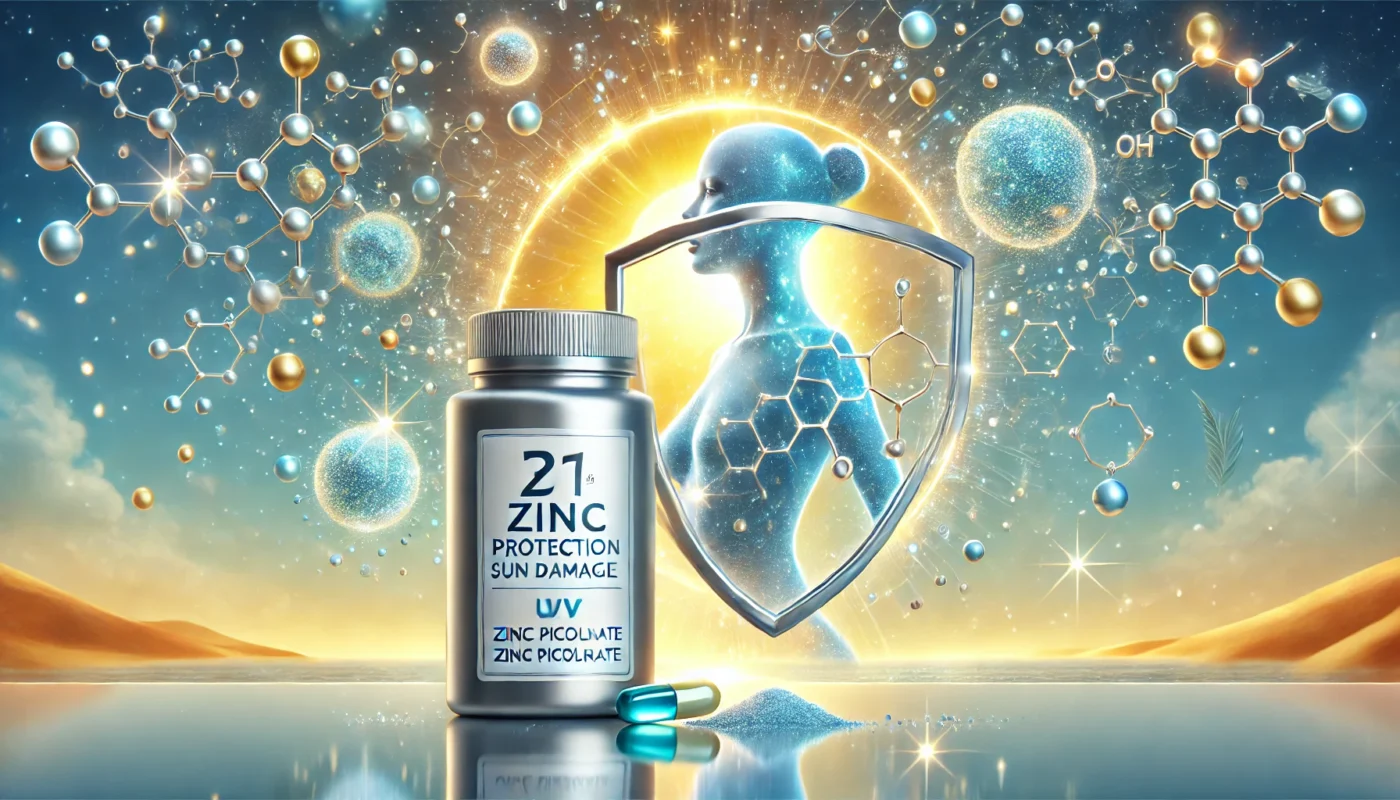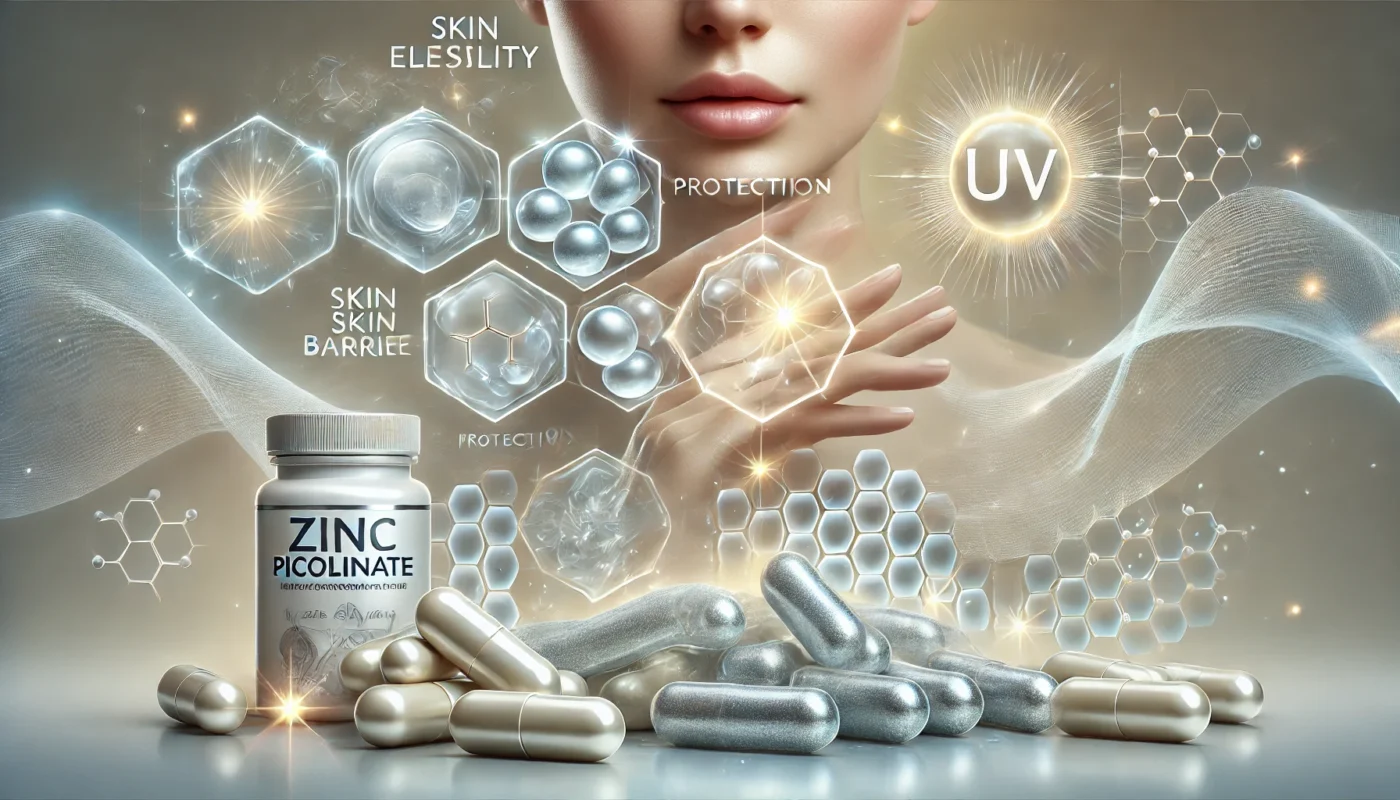Sun exposure is a double-edged sword: while it provides essential vitamin D synthesis, excessive ultraviolet (UV) radiation can lead to premature aging, sunburn, and an increased risk of skin cancer. Protecting the skin from UV damage is critical, and while sunscreen is a cornerstone of sun protection, nutrition plays a pivotal role in fortifying the skin from within. Zinc, an essential trace mineral, has emerged as a powerful ally in skin resilience against UV damage.
Zinc picolinate, a highly bioavailable form of zinc, offers unique advantages in promoting skin health and shielding it from oxidative stress induced by UV radiation. This article explores the science behind zinc picolinate’s protective effects, its mechanisms of action, and its potential role in enhancing skin resilience.
You May Also Like:
The Role of Zinc Picolinate in Reducing Dark Spots
Zinc Picolinate for Hormonal Balance: A Natural Solution for Men and Women
The Skin and UV Radiation: Understanding the Impact
The skin is the body’s largest organ and serves as the first line of defense against environmental stressors, including UV radiation. However, excessive sun exposure can overwhelm the skin’s defenses, leading to:
- Sunburn: Acute damage caused by UVB rays.
- Photoaging: Premature aging characterized by wrinkles, pigmentation, and loss of elasticity.
- Oxidative Stress: Damage caused by the overproduction of free radicals, leading to DNA damage and cell death.
- Skin Cancer: Long-term UV exposure increases the risk of basal cell carcinoma, squamous cell carcinoma, and melanoma.

The Role of Zinc in Skin Protection
Zinc plays a multifaceted role in maintaining skin health and protecting it from UV-induced damage:
- Antioxidant Defense:
Zinc is a cofactor for superoxide dismutase (SOD), an enzyme that neutralizes free radicals, reducing oxidative stress caused by UV exposure. - DNA Repair:
Zinc supports the activity of enzymes involved in repairing UV-induced DNA damage, reducing the risk of mutations and skin cancer. - Anti-Inflammatory Effects:
Zinc modulates inflammatory pathways, calming skin irritation and reducing the severity of sunburn. - Skin Barrier Integrity:
Zinc strengthens the skin’s outer layer, improving its ability to withstand environmental stressors. - Regulating Cell Turnover:
Zinc promotes the replacement of damaged skin cells with healthy ones, accelerating recovery after sun exposure.

What Is Zinc Picolinate?
Zinc picolinate is a chelated form of zinc in which zinc is bound to picolinic acid, a natural metabolite that enhances zinc absorption. This superior bioavailability ensures that zinc is effectively delivered to tissues where it is needed most, including the skin. For individuals seeking to bolster their skin’s defenses against UV damage, zinc picolinate offers a reliable and efficient solution.
Zinc Picolinate and UV Protection: Mechanisms of Action
1. Neutralizing Free Radicals
UV radiation generates reactive oxygen species (ROS), which damage skin cells, DNA, and proteins. Zinc picolinate boosts antioxidant defenses by activating SOD and other antioxidant enzymes, mitigating oxidative stress.
- Study Insight: Research published in Free Radical Biology and Medicine found that zinc supplementation reduced oxidative stress markers by 35% in UV-exposed skin cells, protecting them from damage.
2. Enhancing DNA Repair
UV-induced DNA damage, if left unrepaired, can lead to mutations and skin cancer. Zinc picolinate supports the activity of enzymes that repair DNA, ensuring cellular integrity.
- Research Finding: A study in Journal of Investigative Dermatology demonstrated that zinc supplementation enhanced DNA repair rates in keratinocytes exposed to UVB radiation, reducing the risk of carcinogenesis.

3. Reducing Inflammation
Sunburn and photoaging are driven by inflammation caused by UV exposure. Zinc picolinate modulates inflammatory responses, reducing redness, swelling, and pain.
- Clinical Evidence: A trial in Photodermatology, Photoimmunology & Photomedicine found that zinc supplementation reduced sunburn severity by 28% in participants exposed to controlled UV radiation.
4. Supporting Skin Barrier Function
Zinc picolinate strengthens the skin’s barrier by promoting the production of keratin and ceramides, reducing water loss and protecting against environmental damage.
- Study Insight: A study published in Nutrients showed that zinc supplementation improved skin hydration and resilience in participants with dry or UV-damaged skin.

Zinc Picolinate and Long-Term Skin Health
1. Preventing Photoaging
Zinc’s antioxidant and anti-inflammatory properties help counteract the collagen degradation and elastin damage caused by UV exposure, reducing wrinkles and sagging.
- Evidence: A study in Dermatologic Therapy found that zinc supplementation improved skin elasticity and reduced the appearance of fine lines in middle-aged participants.
2. Reducing Hyperpigmentation
UV exposure can lead to melanin overproduction, causing dark spots and uneven skin tone. Zinc picolinate regulates melanogenesis, promoting an even complexion.
- Clinical Insight: Research in International Journal of Cosmetic Science reported that zinc reduced hyperpigmentation in participants with sunspots by 22% after three months of supplementation.
3. Lowering Skin Cancer Risk
Zinc picolinate’s ability to repair DNA, reduce oxidative stress, and modulate immune responses contributes to a lower risk of skin cancer associated with chronic sun exposure.
- Study Finding: A review in Cancer Prevention Research highlighted zinc’s role in reducing the incidence of UV-induced skin cancers in preclinical models.

Zinc Deficiency and Increased UV Sensitivity
Zinc deficiency impairs the skin’s ability to defend against UV radiation, leading to increased sensitivity and slower recovery. Common signs of zinc deficiency include:
- Frequent sunburns
- Dry, flaky, or irritated skin
- Delayed wound healing
- Increased susceptibility to skin infections
Statistics:
- A study in Clinical Nutrition found that individuals with low zinc levels were 40% more likely to experience severe sunburns after moderate UV exposure.
Dietary Sources of Zinc for Skin Health
In addition to supplementation, incorporating zinc-rich foods into your diet can support skin resilience:
- Animal-Based Sources: Oysters, beef, chicken, and eggs.
- Plant-Based Sources: Pumpkin seeds, lentils, chickpeas, and quinoa.
However, plant-based sources may have lower bioavailability due to phytates, which inhibit zinc absorption. This makes zinc picolinate a valuable option for individuals with dietary restrictions.

Recommended Dosage and Safety
The recommended dietary allowance (RDA) for zinc is:
- Adult men: 11 mg/day
- Adult women: 8 mg/day
For improving skin resilience, therapeutic doses of zinc picolinate typically range from 15–30 mg/day. However, excessive zinc intake (above 40 mg/day) can lead to:
- Nausea
- Gastrointestinal discomfort
- Reduced copper absorption
Note: Always consult a healthcare provider before starting supplementation to determine the appropriate dosage and ensure safety.

How to Incorporate Zinc Picolinate Into a Sun Protection Routine
- Pair with Sunscreen: Zinc picolinate complements topical sunscreen by protecting the skin from within.
- Adopt an Antioxidant-Rich Diet: Include foods high in vitamins C and E, which work synergistically with zinc to neutralize free radicals.
- Hydrate and Repair: Use zinc-enriched moisturizers to support barrier function and accelerate recovery after sun exposure.
Future Research Directions
While current findings highlight zinc picolinate’s protective effects against UV damage, further studies could explore:
- Its long-term role in preventing skin cancer.
- Synergistic interactions with other nutrients, such as selenium and vitamin D, in enhancing skin health.
- Its effectiveness in managing sun-sensitive skin conditions, such as lupus or rosacea.
Conclusion: Zinc Picolinate for Skin Resilience
Zinc picolinate offers a powerful, science-backed approach to protecting the skin from UV damage and oxidative stress. By enhancing antioxidant defenses, supporting DNA repair, and reducing inflammation, zinc picolinate strengthens the skin’s natural resilience and promotes long-term health.
For individuals seeking a comprehensive sun protection strategy, incorporating zinc picolinate into a balanced skincare and nutritional routine can provide significant benefits. As always, consult with a healthcare provider to tailor supplementation to your specific needs and ensure safe and effective use.

References
- Zinc and skin health: overview of physiology and pharmacology. Retrieved from: https://pubmed.ncbi.nlm.nih.gov/16029676/
- Effects of Zinc Supplementation on Inflammatory Skin Diseases: A Systematic Review of the Clinical Evidence. Retrieved from: https://pubmed.ncbi.nlm.nih.gov/31745908/
- Zinc therapy in dermatology: a review. Retrieved from:
- Zinc: role in immunity, oxidative stress and chronic inflammation. Retrieved from: https://pubmed.ncbi.nlm.nih.gov/19710611/
- Zinc in Wound Healing Modulation. Retrieved from: https://pmc.ncbi.nlm.nih.gov/articles/PMC5793244/
Important Note: The information contained in this article is for general informational purposes only, and should not be construed as health or medical advice, nor is it intended to diagnose, prevent, treat, or cure any disease or health condition. Before embarking on any diet, fitness regimen, or program of nutritional supplementation, it is advisable to consult your healthcare professional in order to determine its safety and probable efficacy in terms of your individual state of health.
Regarding Nutritional Supplements Or Other Non-Prescription Health Products: If any nutritional supplements or other non-prescription health products are mentioned in the foregoing article, any claims or statements made about them have not been evaluated by the U.S. Food and Drug Administration, and such nutritional supplements or other health products are not intended to diagnose, treat, cure, or prevent any disease.

